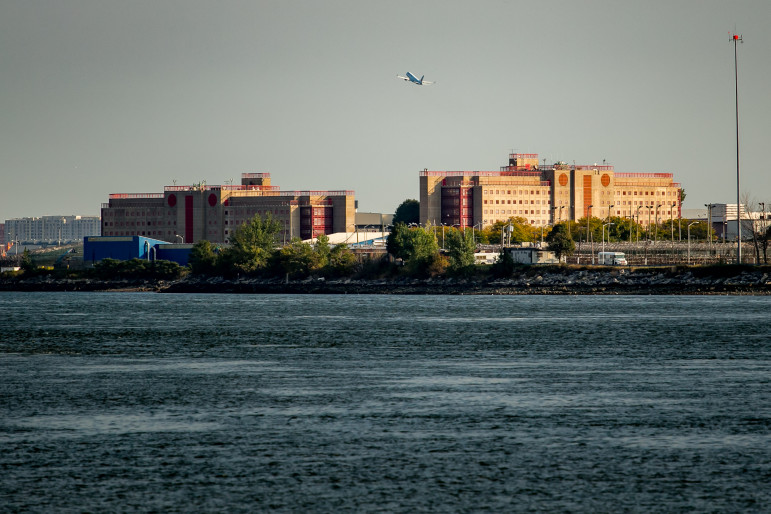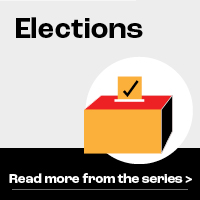Between June 2020 and the end of June 2021, DOC officials submitted nearly 1,800 voter registrations, ballot requests, and ballots to the city Board of Elections on behalf of those detained in the jails. This includes more than 900 completed voter registration forms.

Adi Talwar
George R. Vierno Center on Rikers Island, seen from the Bronx.In any other election year, Greg Williams would have voted at a polling place near his home in Harlem, the way he almost always has.
2020, of course, was not a typical year, particularly for Williams, who was detained on Rikers Island in the fall for a parole violation—meaning he was behind bars at the time of the presidential election that November.
Had he been locked up in Chicago, Los Angeles, or Washington, D.C., Williams would have been able to vote in-person at the jail on Election Day, but New York City does not offer those in its jails a similar opportunity.
Instead, those detained here must request, receive, and return absentee ballots to have their votes count, something advocates say limits their ability to participate in the electoral process.
Although Williams said he did see flyers informing those at the jail about the November 2020 election, he ultimately missed the deadline to submit an absentee ballot—the only voting option for those in city jails. Unlike prisons, people being held in jails are often awaiting trial or are there for short stints, meaning the population is frequently moving and out.
“There were papers out for the guys that were able to reach in time,” Williams said, saying the notices encouraged detainees to register for absentee ballots. Since city jails don’t facilitate in-person voting, missing the absentee deadline meant he was ultimately unable to cast his vote.
“If you’re in the county jail and you’re only alleged to do something, that means you’re presumed innocent,” he told City Limits. “If you’re presumed innocent, and they’re removing your physical liberty, they shouldn’t remove everything else as well. You shouldn’t be stripped of every single thing, including something as important as your right to vote and to have your voice heard in your community.”
Earlier this year, advocates for those detained in New York City’s jails petitioned officials for increased access to voting ahead of the city’s June primary elections, which included all-important contests for mayor, comptroller, public advocate and City Council. Restrictions in place because of the COVID-19 pandemic made it harder for legal rights groups to do voter education outreach and monitor how jails were handling ballot access, advocates said.
“Our clients were just routinely telling us they had not received information,” said Anthony Posada, an attorney at the Legal Aid Society. “Basically they were being stripped of their right to vote.”
In April, the DOC told City Limits that it was mounting an effort to supply those in city jails with voter packets that included information on the election and the new ranked-choice voting system in English and Spanish. Williams and some advocates for those locked-up at Rikers said they had seen some of these resources at the jails; Advocates were also able to go to the jails in-person to educate and help register voters twice in June, when the facilities reopened to visitors.
Between June 2020 and the end of June 2021, DOC officials submitted nearly 1,800 voter registrations, ballot requests, and ballots to the city Board of Elections on behalf of those detained in the jails. This includes more than 900 completed voter registration forms, a DOC spokesperson said. More than 5,500 people were being held in the city’s jail facilities in June, state records show.
In all of 2019, the DOC hand-delivered 501 registration forms to those in city jails and 805 election forms, which include ballots and ballot requests. The year before that, 624 registration forms were distributed to detainees, and a total of 1,171 election forms were submitted to the BOE.
“We are proud of the work that we are doing to facilitate voter engagement in our facilities,” DOC’s deputy commissioner of public information Peter Thorne said in a statement to City Limits. “From distributing and hand-delivering voter registration forms and ballots, to educating individuals about the new Ranked Choice Voting, we are dedicated to ensuring that people know their civic rights and have an active voice in matters that affect their communities.”
Still, advocates said that the DOC and BOE could better coordinate voting access in city jails, particularly by setting up in-person voting in the facilities, which would remove the barriers and deadlines imposed by the current reliance on absentee ballots.
“To the degree that any access to voting is happening at all in the city jails, it’s because some volunteers or some individual took some initiative,” said Sarita Daftary, co-director of the Freedom Agenda, a project of the Urban Justice Center. “There’s not a coordinated approach from the department or from the Board of Elections to ensure that people who are on Rikers—who overwhelmingly are able to vote—can actually exercise that right.”
While the city’s Charter requires DOC and other agencies to “administer a program of distribution of voter registration forms,” and while the agency has made an effort to improve voter participation, there is a “dire need to have an actual law that directs the Department of Corrections to actually provide a process and mechanisms for people to actually engage with voting,” Posada said, which would establish clear guidelines and metrics for the department to meet. “Without this it is not substantive.”









